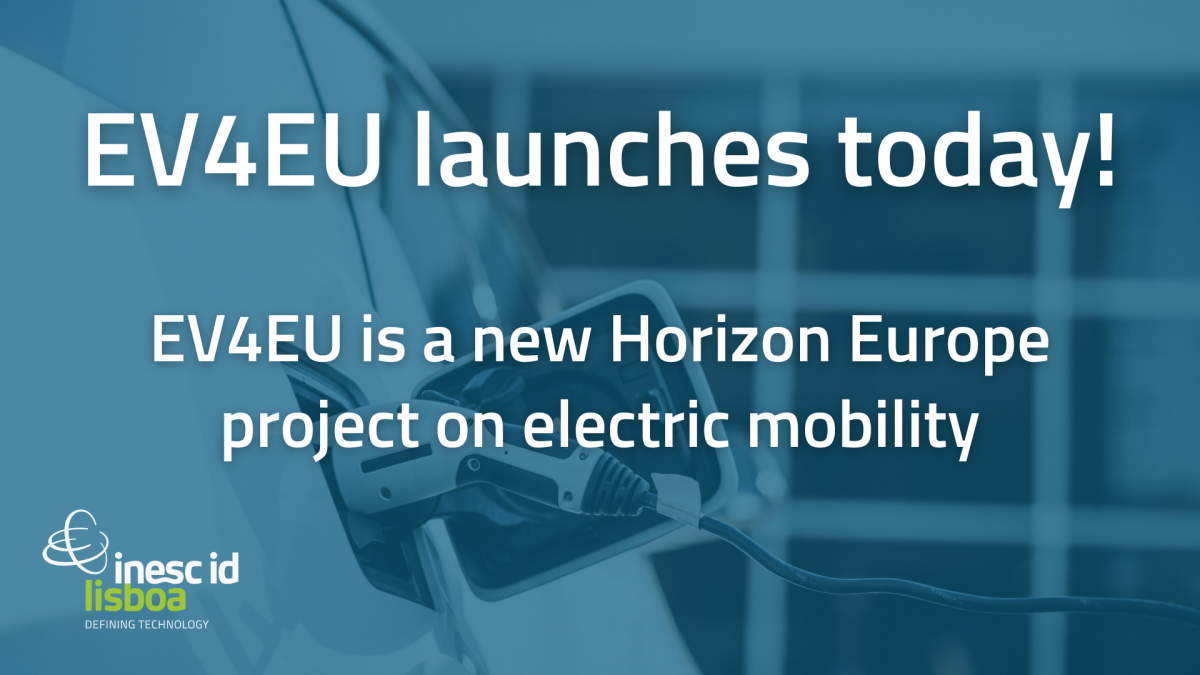
EV4EU launches today!
EV4EU launches today, 01 June 2022! With a duration of four years, EV4EU is funded by the European Union in 9-million euros through Horizon Europe, the new research and innovation programme for the period 2021-2027.
Studies indicate that the massive use of electric vehicles will significantly contribute to the carbon neutrality goals set for 2050, as defined by the European Commission. However, the mass deployment of electric vehicles (EVs) still presents several challenges. To address these challenges, the “Electric Vehicles Management for carbon neutrality in Europe” (EV4EU) project will propose and implement user-centric Vehicle-to-Everything (V2X) management strategies, creating the conditions for the mass deployment of electric vehicles. The proposed V2X management strategies will be tested at four demonstration sites — in Portugal on the island of São Miguel; in the Mesogia area in Greece; at Risø and Rønne, island of Bornholm, Denmark; and in Slovenia — across a consortium of sixteen entities from four European countries led by INESC-ID.
To mark the project launch, we spoke with Hugo Morais — senior researcher at INESC-ID, Assistant Professor at the Department of Electrical and Computer Engineering (DEEC) of Instituto Superior Técnico, and EV4EU project coordinator — about this new landmark project.
What do you think is, currently, the biggest barrier in the massive implementation of electric mobility?
Hugo Morais: The massive implementation of electric vehicles implies systemic changes at different levels. In addition to barriers related to the technology of the vehicles themselves, which have evolved very quickly in recent years, it is important to overcome barriers related to the diversity and complementarity of charging technologies (slow charging / fast charging), strategies for integrating charging systems in existing installations, namely in residential buildings, service buildings, car parks, energy communities and companies operating fleets of vehicles (light and heavy). Additionally, it is important to mitigate problems that may arise from a significant increase in the electrical power requested from the electrical grids, as well as the lack of planning strategies at the city level to face the massive integration of electric cars. Finally, it is important to develop interaction strategies with electric vehicle users that allow them to get the most out of their vehicles and the best way to charge them, assessing whether there are any impacts on battery performance due to bidirectional charging and with different powers.
What are the main objectives of the EV4EU consortium?
Hugo Morais: The consortium aims to develop a set of strategies [meant to create] solutions that [facilitate] overcoming the barriers identified above.
How will EV4EU’s multiplicity of partners contribute to its goals?
Hugo Morais: The consortium is made up of entities covering the entire electric mobility value chain. In addition to the R&D entities, the consortium has an electric vehicle manufacturer (Citroen), an electric charger manufacturer (ABB), a technology provider (Circle), a charging station operator (PPC), an aggregator ( GEN-i) and four distribution network operators (EDA, BEOF, HEDNO and Elektro Celje). The consortium also has a government entity (Regional Directorate of Energy of the Regional Government of the Azores), an entity focused on social sciences (SEL) and end users (Campus Bornholm). The project also has the support of the Portuguese association of public transport (ANTRAM), a manufacturer of wind systems (Vestas), a business incubator in Slovenia and municipal entities where the demonstrators will be developed.
The demonstrators are complementary both in terms of the solutions used and the strategies to be tested. In Portugal, the demonstrator aims to develop and test V2X solutions and business models that allow the integration of EVs in buildings and companies. In particular, these solutions will be validated in private homes, at the facilities of the Regional Energy Directorate of the Regional Government of the Azores and at the Electricity Company of the Azores. In this demonstrator, a new bidirectional charger that will facilitate the charging of several vehicles simultaneously will be tested, reducing the overall cost of the installation. In Denmark, different car park management strategies will be tested considering different types and uses of car parks. Additionally, coordination methodologies between EVs and renewable production units will be tested in order to demonstrate the complementarity between the technologies. In Greece, a new platform that allows for more efficient management of charging stations, as well as greater interaction with EV users, will be tested. Several business models will be validated through this platform. Additionally, strategies to mitigate the impact of EVs on electrical networks will be investigated. In Slovenia, the demonstrator aims to demonstrate the flexibility introduced by EVs in terms of the management of electricity networks as well as to assess the value that this flexibility could have in electricity markets. These services will be coordinated between the distribution network operator and an aggregator in order to create benefits for end users.
What do you hope will be EV4EU’s biggest impact after its four-year run?
Hugo Morais: From the above, we can consider that the project will have an important impact on society, proposing new solutions and business models aimed at creating the right conditions for the massive integration of electric cars, contributing to more sustainable mobility.
